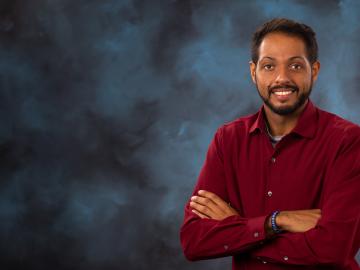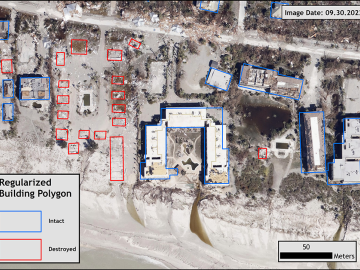
Filter News
Area of Research
- (-) National Security (29)
- (-) Supercomputing (91)
- Advanced Manufacturing (7)
- Biology and Environment (93)
- Computational Biology (2)
- Computational Engineering (2)
- Computer Science (7)
- Electricity and Smart Grid (1)
- Energy Science (116)
- Functional Materials for Energy (1)
- Fusion and Fission (8)
- Fusion Energy (3)
- Isotope Development and Production (1)
- Isotopes (4)
- Materials (94)
- Materials Characterization (1)
- Materials for Computing (19)
- Materials Under Extremes (1)
- Mathematics (1)
- Neutron Science (39)
- Nuclear Science and Technology (7)
- Sensors and Controls (1)
- Transportation Systems (2)
News Topics
- (-) Big Data (25)
- (-) Biology (14)
- (-) Exascale Computing (26)
- (-) Frontier (32)
- (-) Machine Learning (24)
- (-) Materials Science (17)
- (-) Mathematics (2)
- (-) Security (15)
- (-) Space Exploration (3)
- (-) Transportation (8)
- 3-D Printing/Advanced Manufacturing (7)
- Advanced Reactors (2)
- Artificial Intelligence (46)
- Bioenergy (11)
- Biomedical (17)
- Biotechnology (3)
- Buildings (4)
- Chemical Sciences (5)
- Computer Science (105)
- Coronavirus (16)
- Critical Materials (3)
- Cybersecurity (23)
- Energy Storage (9)
- Environment (26)
- Fusion (2)
- Grid (11)
- High-Performance Computing (45)
- Isotopes (2)
- Materials (16)
- Microscopy (7)
- Molten Salt (1)
- Nanotechnology (11)
- National Security (36)
- Neutron Science (15)
- Nuclear Energy (8)
- Partnerships (5)
- Physics (9)
- Polymers (2)
- Quantum Computing (20)
- Quantum Science (26)
- Simulation (16)
- Software (1)
- Summit (43)
Media Contacts

Having lived on three continents spanning the world’s four hemispheres, Philipe Ambrozio Dias understands the difficulties of moving to a new place.

Laboratory Director Thomas Zacharia presented five Director’s Awards during Saturday night's annual Awards Night event hosted by UT-Battelle, which manages ORNL for the Department of Energy.

Over the past seven years, researchers in ORNL’s Geospatial Science and Human Security Division have mapped and characterized all structures within the United States and its territories to aid FEMA in its response to disasters. This dataset provides a consistent, nationwide accounting of the buildings where people reside and work.

ORNL researchers are deploying their broad expertise in climate data and modeling to create science-based mitigation strategies for cities stressed by climate change as part of two U.S. Department of Energy Urban Integrated Field Laboratory projects.

A new paper published in Nature Communications adds further evidence to the bradykinin storm theory of COVID-19’s viral pathogenesis — a theory that was posited two years ago by a team of researchers at the Department of Energy’s Oak Ridge National Laboratory.

A multi-lab research team led by ORNL's Paul Kent is developing a computer application called QMCPACK to enable precise and reliable predictions of the fundamental properties of materials critical in energy research.

Researchers at the Department of Energy’s Oak Ridge National Laboratory and their technologies have received seven 2022 R&D 100 Awards, plus special recognition for a battery-related green technology product.

When the COVID-19 pandemic stunned the world in 2020, researchers at ORNL wondered how they could extend their support and help

Doug Kothe has been named associate laboratory director for the Computing and Computational Sciences Directorate at ORNL, effective June 6.

The Frontier supercomputer at the Department of Energy’s Oak Ridge National Laboratory earned the top ranking today as the world’s fastest on the 59th TOP500 list, with 1.1 exaflops of performance. The system is the first to achieve an unprecedented level of computing performance known as exascale, a threshold of a quintillion calculations per second.


